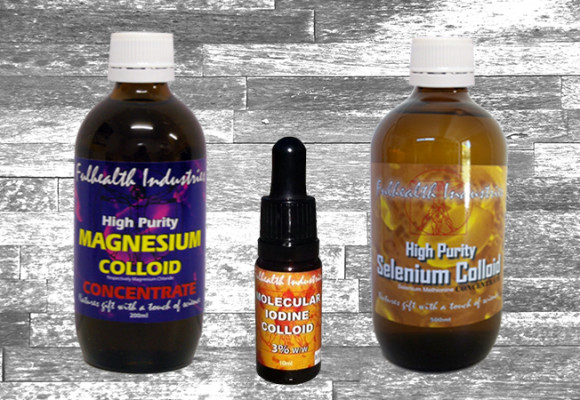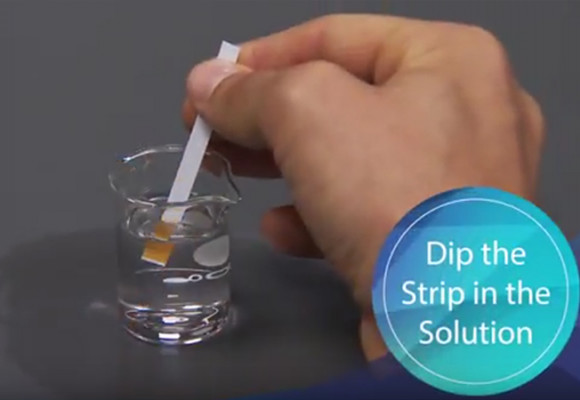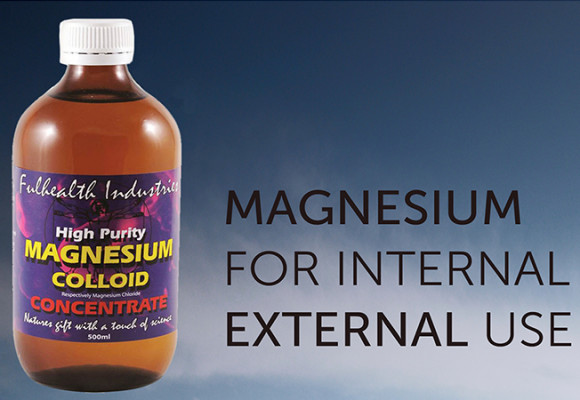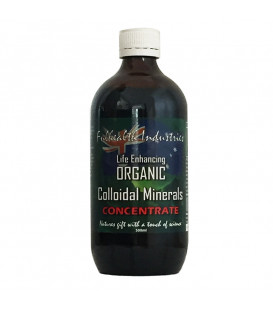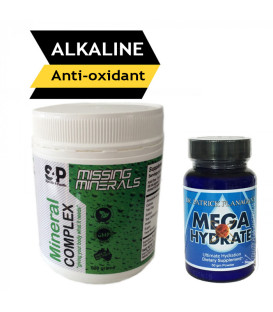
An A to Z of Vitamins and Minerals
An A to Z of Vitamins and Minerals
With today's multitude of capsules and pills available for our pill-popping society, the old knowledge of "nutrition from the garden" is slowly but surely being forgotten.
The human body cannot utilise vitamins without minerals.
The human body is made up by the very nature of the Earth and it is sustenance from the earth that the body requires for health, regeneration and repair.
It is the subtle "heaviness" of matter that gives all conscious organic life-forms the ability to experience "the Earth's lightness & vitality!"
Is it wise to separate the whole into multiple forms of isolation?
Is it wise to focus on just one specific vitamin or mineral at the expense of the whole?
Maybe that's why Mother Nature placed a whole lot of variety & goodness in the "fruit of the garden" be the fruit a piece of fruit or a vegetable.
Listed are the food sources (organic always reins supreme) and how they're helpful.
Vitamin A (Retinol)
- Vitamin A is an essential fat-soluble vitamin.
- Adult RDI 600 - 1300µg, children 300 - 400µg, infants 400 - 500µg
- Stimulates appetite and is necessary for normal bone growth, tooth development and for the maintenance of skin integrity, mucous membranes, hair, eye sight.
- Vitamin A is involved in formation of antibodies and disease resistance. Improves reproductive performance.
- Vitamin A can be found in: dark leafy green vegetables (spinach & broccoli), and yellow/orange vegetables & fruits (carrots, cantaloupe, winter squash, pumpkin, melon, mango, tomatoes not corn or banana).
- Deficiency signs are anaemia, bone weakness, joint pain, cracked teeth.
Vitamin B1 (Thiamin)
- Thiamin is an essential water-soluble B-vitamin classified as vitamin B1.
- Adult RDI 0.9 - 1.4mg, children 0.5 - 0.6mg, infants 0.2 - 0.3mg
- Maintains general metabolism and maintenance of normal muscle and nerve function.
- Increases and assists in maintaining appetite.
- Helps release energy from carbohydrates and nervous system function.
- Used in the treatment and prevention of polio encephalomalacia resulting from vitamin B1 deficiency.
- Reduces nervous symptoms.
- Thiamin is found in abundance in Brewer's yeast, wheat germ/bran, whole-grain cereals, nuts, greens and beans.
- Destroyed during cooking, food storage and exposure to light.
- Thiamin deficiency risk runs highest for those who perform strenuous work or exercise, who are pregnant or lactating and who are running a fever.
- Deficiency signs are depression, muscle weakness, apathy, confusion, irritability.
Vitamin B2 (Riboflavin)
- Riboflavin is an essential water-soluble B-vitamin classified as vitamin B2.
- Adult RDI 0.9 - 1.6mg, children 0.5 - 0.6mg, infants 0.3 - 0.4mg
- Riboflavin is crucial in providing energy for tissue cell growth and repair.
- Helps release energy from foods.
- Maintains integrity of skin, mucous membranes and vision.
- Essential for healthy nails and hair.
- Required for general metabolism and growth.
- Riboflavin is found in whole grains, brewer's yeast, torula yeast, wheat germ, almonds, sunflower seeds, leafy vegetables (asparagus, broccoli, spinach), mushrooms, dairy products.
- Deficiency signs are minor injuries that don't heal, confusion, greasy skin.
Vitamin B3 (Niacin, Niacinamide or Nicotinic acid)
- Niacin is an essential water-soluble B-vitamin classified as vitamin B3.
- Adult RDI 12 - 18mg, children 6 - 8mg, infants 2 - 4mg
- Maintains general metabolism and red blood cell formation.
- Prevents pellagra associated with niacin deficiency.
- Improves appetite and growth rate, and maintains skin and hair condition.
- Reduces levels of blood cholesterol.
- Needed for nervous and digestive system functions.
- Essential for protein and carbohydrate metabolism. Niacin is found in wheat germ, rice bran, nuts, sunflower seeds, brown rice.
- Deficiency signs are fatigue, no appetite, indigestion, diarrhoea, dermatitis, confusion.
Vitamin B5 (Pantothenic acid or Pantothenate)
- Pantothenic acid is an essential water-soluble B-vitamin.
- Adult RDI 4 - 7mg, children 2 - 3mg, infants 1.7 - 1.8mg
- Needed for the synthesis of cholesterol and fatty acids.
- Plays a key role in energy metabolism, reproduction, growth and nerve function.
- Assists in transmission of nerve impulses.
- Improves health of skin.
- Pantothenic acid is found in mushrooms, broccoli, legumes and whole grains.
- Deficiency signs are fatigue, apathy, nausea, insomnia, depression, irritability.
Vitamin B6 (Pyrodoxine, Pyrodoxal & Pyrodoxamine)
- Pyrodoxine is an essential water-soluble B-vitamin- classified as vitamin B6.
- Adult RDI 1.0 - 2.0mg, children 0.5 - 0.6mg, infants 0.1 - 0.3mg
- Stored in muscle tissue, used to synthesis amino acids for muscle growth and repair.
- Necessary for general metabolism, nervous system function and vision.
- Maintains integrity of skin.
- Facilitates red blood cells formation.
- Important for normal reproductive processes and healthy pregnancies.
- Pyrodoxine is found in brewer's yeast, potatoes, bananas, avocado, wheat germ/bran, soybeans, blackstrap molasses, cantaloupe, nuts, seeds, whole grains.
- Deficiency signs are anaemia, depression, confusion, fatigue, headaches, dermatitis.
Vitamin B9 (Folic acid, folicin)
- Folate is an essential water-soluble B-vitamin.
- Adult RDI 300 - 600µg, children 150 - 200µg, infants 65 - 80µg
- Vitamin B9 activates B12, assists in formation of red and white blood cells and haemoglobin so necessary for the healing process.
- Aids in the metabolism of proteins and contributes to normal growth.
- Vitamin B9 is essential for the woman carrying child (pregnancy). Needed by rapidly dividing cells including intestinal epithelial cells, the growing foetus, skin and hair.
- Vitamin B9 can be found in deep green leafy vegetables, lima beans, spinach, nuts, broccoli, oranges, avocados.
- Deficiencies signs are fatigue, skin sensitivity, anaemia, sore tongue and occur during new cell synthesis: pregnancy, cancer, burns, measles and blood loss.
Vitamin B12 (Cobalamin or Cyanocobalamin)
- Vitamin B12 is an essential water-soluble B-vitamin.
- Adult RDI 1.8 - 2.8µg, children 0.9 - 1.2µg, infants 0.4 - 0.5µg
- Facilitates red blood cell formation and helps prevent anaemia.
- Necessary for general metabolism, nervous and reproductive function.
- Improves hair condition.
- Vitamin B12 can be found in sunflower seeds, comfrey leaves, kelp, bananas, peanuts, raw wheat germ, dairy products.
- Deficiency signs are fatigue, skin sensitivity, anaemia, sore tongue.
Vitamin Biotin (Vitamin H)
- Biotin is an essential water-soluble B-vitamin.
- Adult RDI 20 - 35µg, children 8 - 12µg, infants 5 - 6µg
- Necessary for energy-producing fatty acid metabolism.
- Biotin can be found in Brewer's yeast, soybeans, eggs, whole grains (seeds), unpolished rice.
- Deficiency signs are fatigue, skin rash, lethargy, depression, hair loss.
Vitamin C (Ascorbic acid or Ascorbate)
- Vitamin C is an essential water-soluble vitamin
- Adult RDI 45 - 125mg, children 15 - 25mg, infants 5 - 10mg
- Necessary for neurotransmitter synthesis (helping with coordination).
- Aids in wound healing, metabolism of amino acids, fats and lipids, growth of cartilage, and tendons.
- Necessary for red blood cell production and absorption of iron for blood.
- Essential for proper functioning of adrenal and thyroid glands.
- Improves bone and muscle growth.
- Vitamin C can be found in all fresh fruits and vegetables, strawberries, apples, cabbage, tomatoes.
- Deficiency signs are poor wound-healing, bone fractures, aching joints, ruptured blood vessels, improperly formed teeth, common cold.
Vitamin D (Calciferol or Sunshine Vitamin)
- Vitamin D is an essential fat-soluble vitamin
- Adult RDI 5 - 10µg, children 5µg, infants 5µg
- Helps in the absorption of calcium, phosphorous and magnesium
- Needed for growth, strength and maintenance of bones and teeth
- Vitamin D can be found in sprouted seeds, mushrooms, sunflower seeds. Previtamin D3 is synthesised in the body when you are exposed to sunlight
- Deficiency signs are bone weakness (osteomalacia - rickets) and brittle bone (osteoporosis)
Vitamin E (Tocopherol)
- Vitamin E is an essential fat-soluble vitamin
- Adult RDI 11 - 19mg, children 6 - 5mg, infants 4 - 5mg
- Vitamin E is a natural antioxidant and works with or is recharged by Vitamin C.
- Helps form red blood cells and transporting nutrients. Prevents oxidation damage and protects cell wall fluidity by reducing the formation of harmful free-radicals.
- Assists in the maintenance of reproductive function and immune response.
- Acts in conjunction with selenium.
- Improves metabolism of fat from high fat diets.
- Vitamin E can be found in nuts and grains, green leafy vegetables, hemp seed oil, cold pressed olive oil.
Vitamin K (Menadione)
- Vitamin K is an essential fat-soluble vitamin
- Adult RDI 80mcg, children 35mcg, infants 15mcg
- Vitamin K is needed to coagulate blood (blood clotting), maintain proper bone density and liver function.
- Required for calcium metabolism and prevents vitamin D deficiency.
- Vitamin K plays a key role in proper development of the foetus.
- Vitamin K can be found in kelp, alfalfa and soybean oil with the highest content found in leafy green vegetables such as lettuce, kale, broccoli and collard greens. Including yogurt, kefir, and acidophilus milk into the diet may help to increase the functioning of the intestinal bacterial flora and therefore contribute to vitamin K production.
- Vitamin K deficiencies have been linked to heavy menstrual bleeding, nose bleeds, easy bruising, osteoporosis and anaemia.
Calcium
- Calcium is an essential macromineral for stamina.
- Adult RDI 1000 300mg, children 500 800mg, infants 210 270mg
- The most abundant mineral in the body.
- Essential for the strength and growth of skeletal bones and teeth.
- Calcium helps the muscles contract.
- Assists in cardiac regulation and nerve function.
- Maintains the normal clotting process of blood.
- Prevents osteomalacia and rickets.
- Increased requirement during lactation.
- Calcium can be found in dark leafy vegetables, sesame seeds, oats, navy beans, almonds, water, milk, milk products, tofu and cauliflower.
- Calcium deficiencies have been linked to bone weakness, brittle bones, cracked teeth and fatigue.
Chromium
- Chromium is an essential mineral for carbohydrate metabolism.
- Adult RDI 20 45µg, children 11 15µg, infants 0.2 5.5µg
- Essential for the transport of glucose into cells and conversion of body fat into energy.
- Helps retard lactic acid accumulation during exercise, and improve ratio of lean muscle to fat deposition.
- Chromium can be found in nuts and vegetable oils.
Cobalt
- Assists formation of B12, and subsequent formation of red blood cells and haemoglobin.
Copper
- Copper is an essential macromineral for stamina and ageless zest.
- Adult RDI 700 1300µg, children 340 440µg, infants 200 220µg
- Involved in protein metabolism, in healing processes and in keeping hair's natural colour.
- Copper facilitates absorption and mobilisation of iron. Iron cannot be absorbed without copper.
- Assists formation of haemoglobin in red blood cells.
- Maintains general metabolism, bone, cartilage and connective tissue development, skin condition.
- Cofactor with many enzymes (metalloenzvmes).
- Promotes fertility.
- Copper can be found in water, green leafy vegetables, beans, apricots, peaches, bananas, black molasses, prunes, raisins, whole grain cereals, almonds.
- Copper deficiencies have been linked to high blood cholesterol, anaemia, bone abnormalities.
Fluorine
- Essential for bone and tooth building.
- Protects against infections.
- Fluorine can be found in sunflower seeds, carrots, garlic, almonds.
Iodine
- Iodine is an essential mineral-commonly added to table salt, "iodized".
- Adult RDI 150 220µg, children 90µg, infants 110 130µg
- Essential in the formation of thyroxin - the thyroid hormone which regulates much of physical and mental activity. Component of thyroid hormones, which regulates metabolic processes including hair.
- Prevents goitre associated with iodine deficiency.
- Iodine can be found in seaweed, Swiss chard, turnip greens, garlic, watercress, pineapple, pears, citrus, seafood.
- Iodine deficiencies have been linked to low metabolism, fatigue, lack of initiative.
Iron
- Iron helps reduce inflammation and helps the transportation of nutrients throughout the body.
- Essential for the formation of hemoglobin, which carries oxygen from the lungs to every cell of the body.
- Assists general metabolism, and prevention of iron-deficient anaemia.
- Essential component of haemoglobin in red blood cells.
- Improves pregnancy period, recovery from parasite infestation, and general performance.
- Iron can be found in apricots, peaches, bananas, black molasses, prunes, raisins, cherry juice, whole grain cereals, turnip greens, spinach, dry beans.
Magnesium
- Magnesium is an essential micromineral in the development of stamina.
- Adult RDI 1.9 2.6mg, children 80 130mg, infants 30 75mg
- Most magnesium reserves are bound in bone and teeth.
- Magnesium helps the muscles relax after contraction.
- Necessary for blood clotting and regulating blood pressure.
- Required for metabolism of food into energy and immune system performance.
- Magnesium can be found in water, nuts, soybeans, green leafy vegetables, figs, apples, watermelon, lemons, peaches, almonds, chocolate.
- Magnesium deficiencies have been linked to physical, emotional and mental weakness, confusion, bizarre muscle movement, fatigue.
Manganese
- Manganese is an essential micromineral in the development of stamina.
- Adult RDI 1.9 2.6mg, children 1.2 1.5mg, infants 0.003 0.6mg
- A common enzyme cofactor (metalloenzvmes).
- Cofactor with many enzymes to efficiently convert food into energy - importantly involved in the metabolism of carbs, fats and proteins.
- Maintains general metabolism, development of bone, cartilage and connective tissue.
- Assists normal clotting process of blood.
- Improves growth rate, reproduction and lactation.
- Stored in bone, liver and kidneys.
- Manganese can be found in spinach, beets, blueberries, oranges, grapefruit, apricots, kelp, green leafy vegetables.
Molybdenum
- Molybdenum is an essential micromineral.
- Adult RDI 34 50µg, children 17 22µg, infants 2 3µg
- Cofactor with many enzymes to efficiently convert food into energy.
- Molybdenum can be found in green leafy vegetables, milk, milk products, whole grains.
Pantothenic acid
- Pantothenic acid wards off infections and speeds recovery from illnesses.
- Pantothenic acid can be found in Royal jelly, whole-grain breads/cereals, green vegetables, peanuts.
Phosphorus
- Phosphorous is an essential macromineral for stamina and ageless zest.
- Adult RDI 700 1250mg, children 460 500mg, infants 100 275mg
- The second most abundant mineral in the body.
- Essential for bone strength, bone growth and teeth strength.
- Works together with calcium and must be balanced to be effective.
- Assists general metabolism and nerve function.
- Improves buffering systems in blood and other body fluids.
- Required for all energy reactions in the body, key component of DNA and RNA.
- Phosphorus can be found in whole-grains, beans, seeds, nuts, legumes, dried fruit, corn, milk and milk products.
- Phosphorus deficiencies have been linked to weak teeth, bone weakness, fatigue and lethargy.
Potassium
- Potassium helps regulate the water balance in the body. Working with sodium, it keeps the heartbeat regular and nourishes the muscles.
- Potassium is important in keeping acid-alkaline balance in the blood.
- Assists the digestion and utilisation of dietary nutrients.
- Aids in maintaining of tissue fluid balance, and energy metabolism.
- Aids in muscular contraction, nerve function, and heart muscle relaxation.
- Essential for muscle contraction and normal heart beat.
- Potassium can be found in green leafy vegetables, oranges, bananas, mint leaves, whole grains, potatoes.
Selenium
- Selenium is an essential micromineral for stamina.
- Adult RDI 40 70mg, children 90mg, infants 15 20mg
- As an antioxidant - supports the cell-protecting action of Vitamin E by detoxifying peroxides.
- Selenium and Vitamin E work in antioxidant synergy.
- Needed for proper thyroid (metabolism function).
- Improves growth and fertility.
- Improves immunity and milk production.
- Selenium can be found in grapes, pineapples and oranges.
- Selenium deficiencies have been linked to fatigue, heart disease and symptoms of illness relating to the liver and pancreas.
Sodium and Chloride
- Sodium helps regulate the water balance in the body. The body requires sodium to produce hydrochloric acid, which is necessary for absorption of nutrients (food) in the stomach.
- Improves maintenance of correct electrolyte balance in body tissues and prevents dehydration.
- Maintains muscle contraction, nerve activity and digestion of nutrients.
- Replaces salt (NaCl) lost in sweat.
- Regulates fluid and acid base balance; sodium is necessary for hydrochloric acid production in the stomach.
- Sodium and Chloride can be found in kelp, celery, carrots, beetroot, romaine lettuce, watermelon, sea salt - virtually all foods contain sodium.
Sulphur
- Vital for healthy skin, hair and nails.
- Aids in reducing oxidations.
- Sulphur can be found in radish, turnip, onions, celery, horseradish, watercress.
Vanadium
- Vanadium is a trace mineral current research is defining essential roles.
- Adult estimate RDI 0.4mg
- Required for normalising blood glucose, strengthening teeth and bones.
- Vital for healthy skin, hair and nails.
- Vanadium can be found in grains and mushrooms.
Zinc
- Zinc is an essential micromineral for stamina.
- Adult RDI 8 14mg, children 3 - 5mg, infants 2 3mg
- Improves growth rate, and metabolism, and prevents loss of appetite associated with deficiency.
- Required with calcium and magnesium to assist in bone and cartilage development.
- Maintains the integrity of skin and mucous membranes, hair, aids in wound healing, growth, tissue repair, and sexual development.
- Affects blood clotting, thyroid function, insulin activity.
- Activates Vitamin A, foetal development, learning, behaviour.
- Zinc can be found in green leafy vegetables, wheat bran, pumpkin seeds, sunflower seeds, brewer's yeast, onions.
About the Author

Brett Hayes has had an interest in human anatomy from around the age of seven.
Decades later and now with over thirty years’ experience as a body mechanic (injury repair), healer and teacher, the techniques of resurrection and regeneration that Brett shares encompass many aspects including breath/body synchronicity, structural alignment, mind direction and connection to Spirit.
He is the Head Coach and Developer of TriBreath, a practice that use ancient breathing rhythm's as the foundation for specific movements and techniques to help tone, fortify and strengthen your body's muscle and respiratory fitness.
Disclaimer: All information on this web site is for informational purposes only. Under no circumstance is any product on this site intended to diagnose, treat, cure or prevent any disease or condition. Please contact a medical doctor to diagnose and treat any medical condition.


